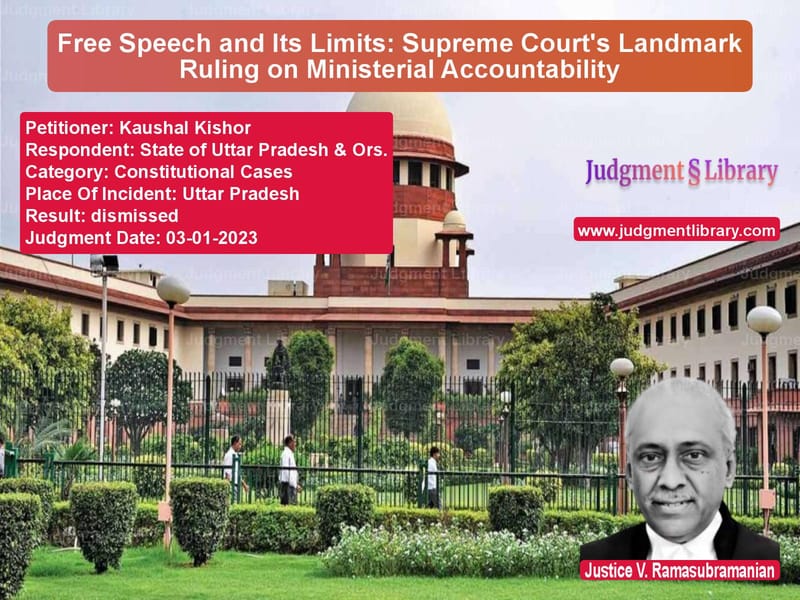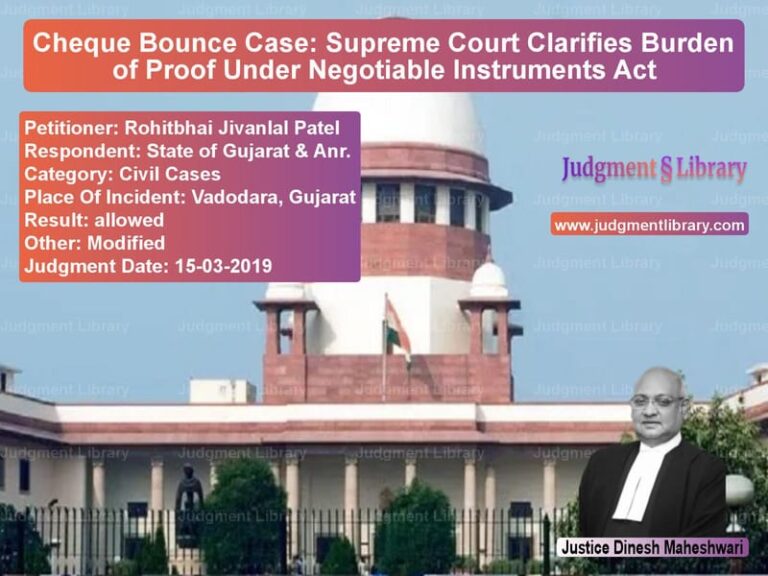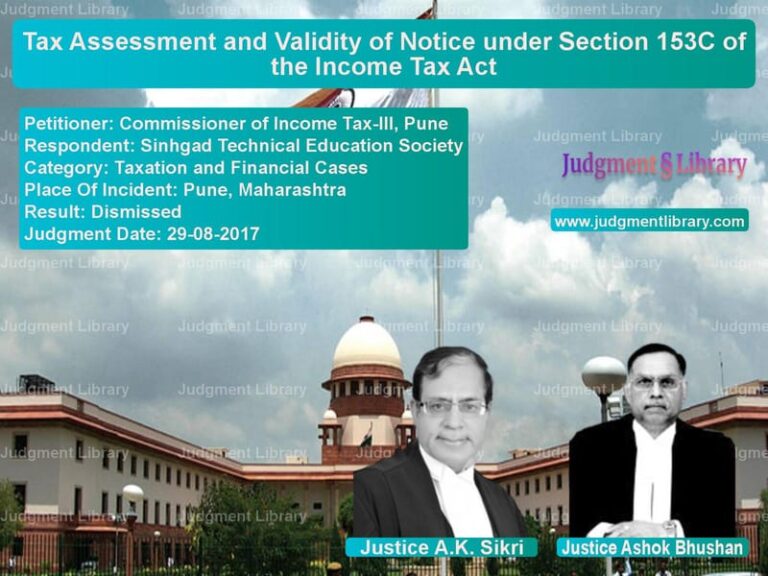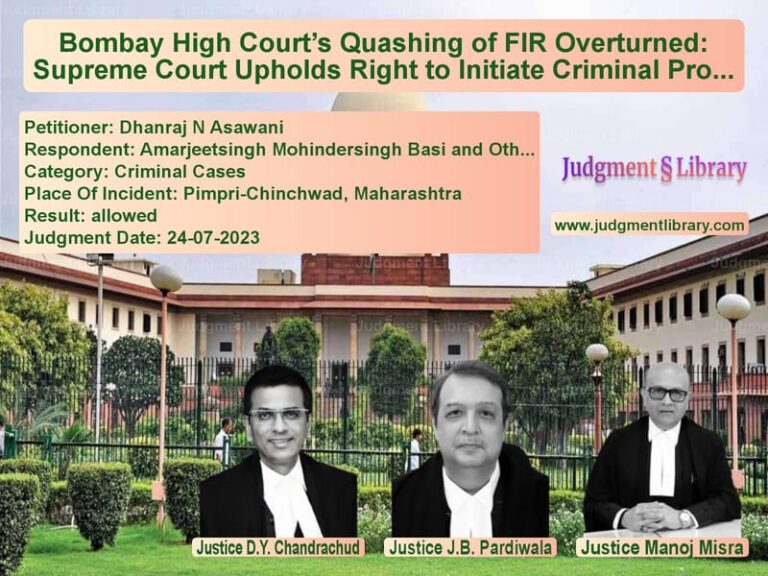Free Speech and Its Limits: Supreme Court’s Landmark Ruling on Ministerial Accountability
The case of Kaushal Kishor v. State of Uttar Pradesh & Ors. is a significant ruling addressing the boundaries of free speech, especially when exercised by public officials. The Supreme Court examined the legal questions surrounding the liability of a minister’s statements and the extent of fundamental rights under Articles 19 and 21 of the Indian Constitution.
The case arose from an incident where a government minister made statements that were considered derogatory to the victims of a serious crime. This prompted a legal challenge, questioning whether such speech could be restricted beyond Article 19(2) and if fundamental rights could be enforced against non-state actors.
Legal Issues Considered
The Constitution Bench framed five key questions:
- Are the grounds in Article 19(2) exhaustive for restricting free speech, or can additional restrictions be imposed by invoking other fundamental rights?
- Can fundamental rights under Articles 19 and 21 be enforced against private individuals or non-state actors?
- Does the state have an obligation to protect fundamental rights against violations by private parties?
- Can a minister’s statement, if inconsistent with constitutional rights, be attributed to the government?
- Can such statements lead to a constitutional tort and become actionable in law?
Arguments by the Petitioner
The petitioner contended that the minister’s statements were irresponsible and derogatory towards the victims, violating their dignity and fundamental rights under Article 21. It was argued that:
- Fundamental rights should be enforceable against private individuals, especially when public officials abuse their position.
- The state must ensure that statements by ministers do not infringe upon citizens’ rights.
- The government should be held accountable for statements made by its ministers, in line with the principle of collective responsibility.
Arguments by the Respondents
The Attorney General, defending the government, argued that:
- The grounds in Article 19(2) are exhaustive, and additional restrictions cannot be imposed through judicial interpretation.
- Fundamental rights, by design, are enforceable only against the state and its instrumentalities.
- While a minister’s statements can be criticized, they cannot be automatically attributed to the government.
- Imposing liability on the government for every minister’s statement would be impractical and legally unsound.
Supreme Court’s Judgment
The Court ruled on each of the five questions as follows:
- Article 19(2) is exhaustive: The Court held that no additional restrictions on free speech could be imposed beyond those listed in Article 19(2). It emphasized that the judiciary cannot create new grounds for restricting speech beyond what is explicitly provided by the Constitution.
- Fundamental rights are primarily enforceable against the state: The Court maintained that Articles 19 and 21 do not generally apply against private individuals, except in cases where constitutional obligations necessitate such enforcement.
- The state has an obligation to protect fundamental rights: The Court ruled that while the state has a duty to protect citizens’ rights, this does not mean that every violation by a private individual automatically results in state liability.
- Ministers’ statements do not automatically bind the government: The Court clarified that individual statements by ministers cannot be attributed to the government unless made in an official capacity. However, ministers must exercise caution in their public remarks.
- Constitutional tort for violating fundamental rights: The Court observed that while ministers may face individual liability for unconstitutional statements, there is no automatic constitutional tort unless specific harm is established.
Significance of the Judgment
This ruling clarifies the limits of free speech for public officials and reaffirms that fundamental rights are primarily enforceable against the state. It also establishes that the government is not vicariously liable for every statement made by a minister. However, ministers are expected to exercise restraint, as their words carry significant weight in public discourse.
Read also: https://judgmentlibrary.com/rti-and-collegium-decisions-supreme-courts-verdict-on-disclosure/
The decision reinforces that restrictions on free speech must come from the legislature and not judicial interpretation. This ensures a balance between individual liberties and responsible governance.
Conclusion
The Supreme Court’s judgment in this case sets a crucial precedent in defining the scope of free speech, particularly in the context of government accountability. It underscores the need for public officials to act responsibly while safeguarding the constitutional rights of all citizens.
Petitioner Name: Kaushal Kishor.Respondent Name: State of Uttar Pradesh & Ors..Judgment By: Justice V. Ramasubramanian.Place Of Incident: Uttar Pradesh.Judgment Date: 03-01-2023.
Don’t miss out on the full details! Download the complete judgment in PDF format below and gain valuable insights instantly!
Download Judgment: kaushal-kishor-vs-state-of-uttar-prade-supreme-court-of-india-judgment-dated-03-01-2023.pdf
Directly Download Judgment: Directly download this Judgment
See all petitions in Fundamental Rights
See all petitions in Constitution Interpretation
See all petitions in Legislative Powers
See all petitions in Public Interest Litigation
See all petitions in Judgment by V. Ramasubramanian
See all petitions in dismissed
See all petitions in supreme court of India judgments January 2023
See all petitions in 2023 judgments
See all posts in Constitutional Cases Category
See all allowed petitions in Constitutional Cases Category
See all Dismissed petitions in Constitutional Cases Category
See all partially allowed petitions in Constitutional Cases Category







